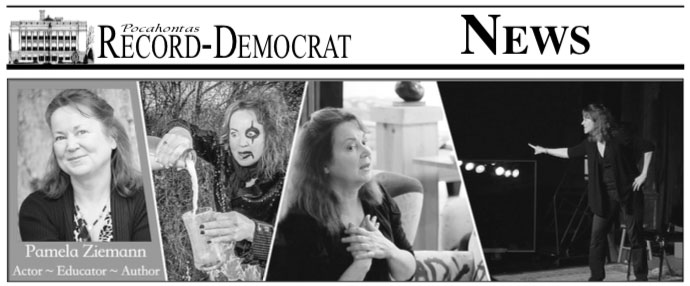
One-woman show puts Midwest’s farming values on stage
By Erin Sommers pokyrdnews@gmail.com
Pamela Ziemann and her dad didn’t always agree on how he should approach farming.
Ziemann, who grew up on her family’s southern Minnesota farm in the 1960s and 1970s, left the Midwest after graduating from high school, settling in Seattle, where she pursued a career as an actress and playwright. She will bring her latest show, “These Roots Go Deep,” to the Rialto at 2 p.m. June 8. Freewill donations will be accepted.
The play looks at the question of how to reconcile her love and respect for her father when he made decisions for the farm that she thought were harmful to the environment. Ziemann started thinking about the show in 2015, right after her father died.
“At that time, I wanted people to know him,” she said.
Her dad, Weldon, was a fourth-generation farmer who was raising corn, oats, hay and soybeans on 380 acres when he won a county Outstanding Farmer Award. Ziemann said she and her dad disagreed on his decisions to use terminator seeds, about her preference for organic produce and her disapproval of the corporate turn of agribusiness. But she said she also understood why her dad made the choices he did.
“He would go with me to the food co-ops (on the West Coast),” Ziemann said. “We were connected, yet he always had this struggle — you have to make so much product to pay for the equipment.”
Farmers have big bills to pay, for inputs, for seed, for the equipment that kept getting bigger and bigger.
The show is peppered with details about Ziemann’s own experiences helping on the family farm, like when she and her siblings would walk the beans, looking for weeds, and how that job disappeared as agriculture changed. Ziemann wanted to tell her dad’s story, to show how he was more than just another Midwestern farmer who sold out to Monsanto, as people might have characterized him. At first, Ziemann looked into commissioning someone to write a play. That turned out to be more complicated and time consuming than she anticipated, so she decided to write the show herself.
“It is one of the most healing things I’ve ever done,” she said.
Performing the show on the coasts has also been incredibly rewarding.
“When I performed the show at Theater Row in New York City, a group of locals took me out for dinner after the show, commenting on the importance of this work,” Ziemann said. “The only information they had about farmers in the midwest was through the news which often pits people against each other.”
Her West Coast experience was similar.
“When I performed the show in Seattle, an audience member blurted out in the talkback how she loved my Dad,” Ziemann said. “Even though the people in that group promote organic farming, they empathized with the decision my Dad made about using inputs. When I performed the show in Grass Valley, CA (where it won Best of Fringe Award) audience members enjoyed hearing about my relationship with my Dad and how farming has changed over the years.”
Ziemann loved her dad, even when they didn’t see eye to eye.
“He was like my superhero,” she said. “He was generous. He loved the land.”
She arrived back in Minnesota a few weeks ago to prepare for the show in Pocahontas, and rehearsing in the living room of her childhood home has brought a new dimension to the experience, she said. Writing the play and looking back through her memories has also given her new insights into her dad.
Take the part of the show in which her dad comes to talk with her after her dog died. Ziemann said she initially only thought about her dad’s comment, that the animal was only a dog. As an adult, she saw the situation differently.
“He saw me at the dinner table,” she said. “He followed me (to the bedroom). He had all this love. I got past the words. When I walked like him (in preparing for the role), it was a completely different feeling than remembering the words he said.”
She sees a broader message in that experience.
“Living in this fast-paced society, it’s more important than ever to slow down, breathe and feel,” she said. “Media pulls us in so many directions telling us what to think, who’s right and who’s wrong and what we need to do to survive, that it’s easy to lose our sense of self. … It’s important to take the time to hear each other’s stories and turn off the news. We have more in common than we might think. It comes down to operating out of love instead of fear.”
